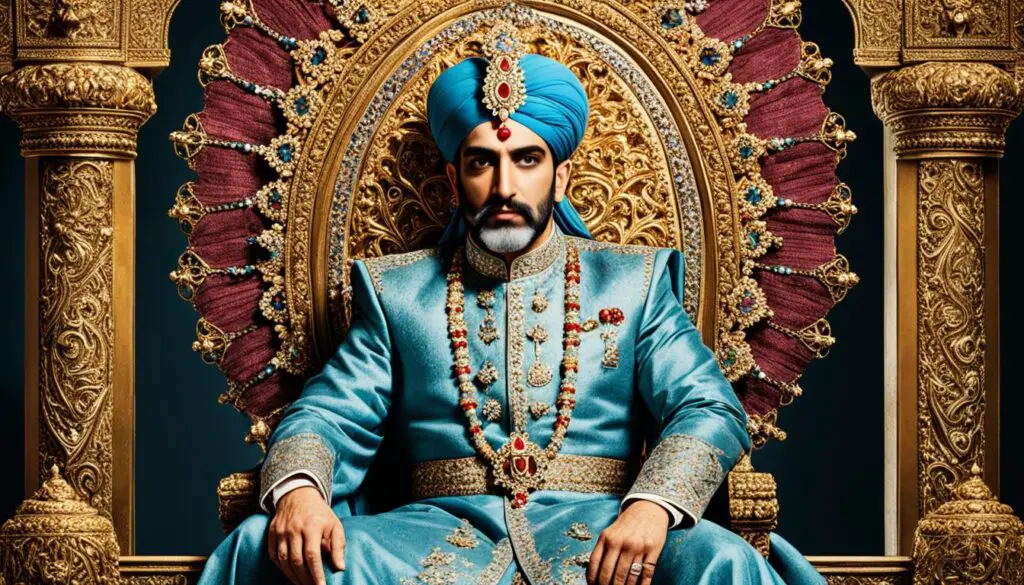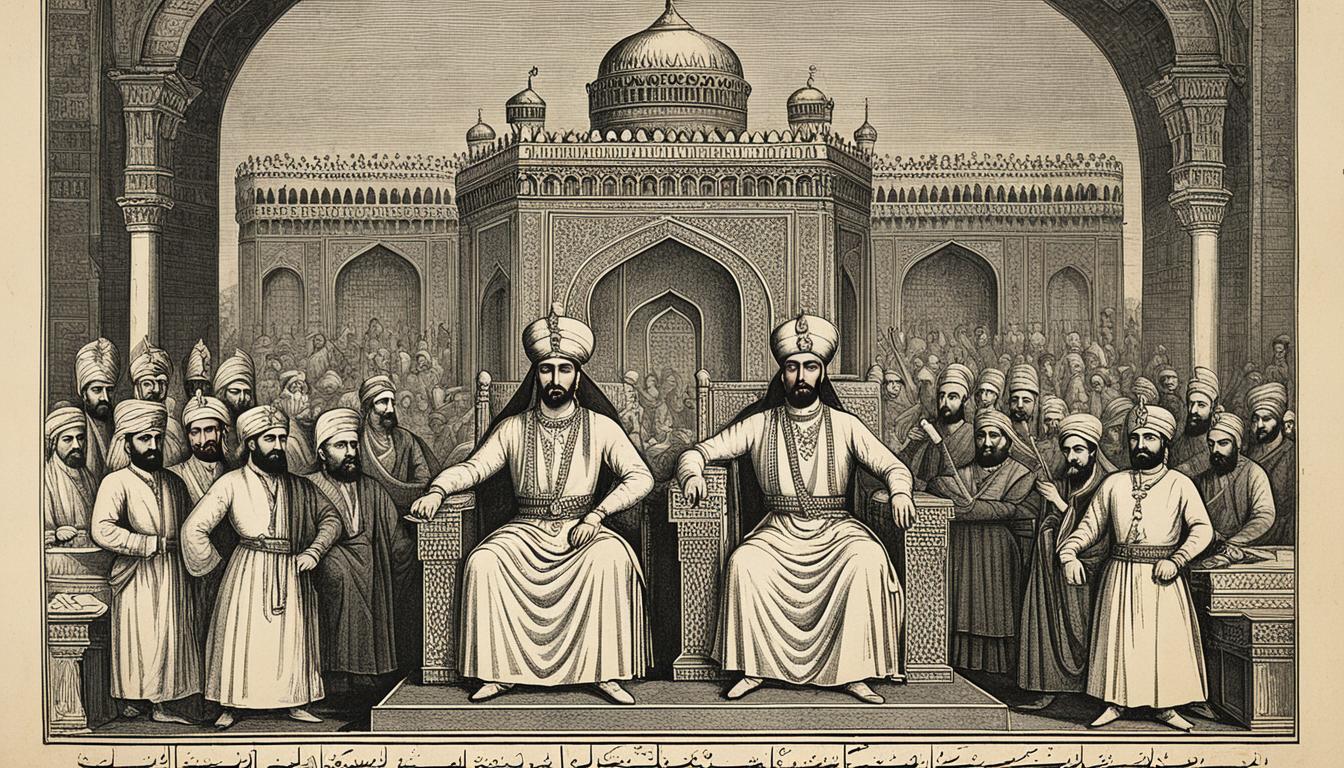Have you ever wondered how one ruler’s radical reforms could spark controversy and shape an entire empire? Enter Muhammad bin Tughlaq, the enigmatic ruler of the Delhi Sultanate. His reign was marked by ambitious initiatives and questionable decisions that still leave historians and scholars pondering centuries later.
- Muhammad bin Tughlaq’s radical reforms and policies generated both admiration and criticism.
- His decision to shift the capital from Delhi to Deogir caused significant distress to the population but fostered cultural exchange.
- His failed introduction of token currency and other ill-planned measures led to the devaluation of the economy.
- Despite his shortcomings, Muhammad bin Tughlaq’s reign witnessed improvements in religious tolerance and educational practices.
- His legacy serves as a reminder of the challenges that come with implementing ambitious reforms.
Early Life and Reign of Muhammad bin Tughlaq
Muhammad bin Tughlaq’s journey as a ruler began with an inauspicious start. He ascended the throne after his father, Sultan Ghiyasuddin Tughlaq, tragically lost his life due to a falling structure. However, Muhammad bin Tughlaq’s reign was immediately marred by accusations of plotting his father’s death, making his early days as Sultan challenging and uncertain.
Despite the controversy surrounding his rule, Muhammad bin Tughlaq made significant decisions that would shape his reign and leave a lasting impact on the Delhi Sultanate. One of his major moves was the shifting of the capital from the bustling city of Delhi to Deogir (Daulatabad), driven by the desire for better centralized control. This decision, although met with immense distress among the population, paved the way for improved communication and cultural exchange between north and south India.
In addition to internal challenges, Muhammad bin Tughlaq also had to face external threats. Mongol invasions posed a serious risk to Delhi, but with resilience and strategic planning, his forces managed to repel the invaders. These victories safeguarded the sultanate from Mongol encroachment and ensured the stability of Muhammad bin Tughlaq’s reign.
However, Muhammad bin Tughlaq faced hindrances in the administration of his empire, particularly in the realm of revenue. His revenue system and relationship with the nobles presented significant obstacles, leading to ongoing challenges throughout his rule. These difficulties would go on to shape the narrative of his reign and contribute to the controversies associated with his name.

To understand the intricacies of Muhammad bin Tughlaq’s reign, it is essential to delve further into his legacy and the controversies surrounding his policies and reforms.
Legacy and Controversies of Muhammad bin Tughlaq
Muhammad bin Tughlaq, the enigmatic ruler of the Tughlaq dynasty, left behind a complex legacy that is still debated by historians. Known for his controversial reforms and policies, he was a ruler who possessed both progressive ideas and a harsh execution of his plans. One of the notable aspects of his rule was his commitment to religious tolerance, which set him apart from his predecessors.
Despite being a Muslim ruler, Muhammad bin Tughlaq demonstrated religious inclusivity by appointing Hindus to high positions within his administration. He celebrated Hindu festivals like Holi, displaying his commitment to fostering harmony and understanding between different religious communities. In addition, he displayed great reverence for Sufi saints, actively seeking their guidance and wisdom. As a student of a Sufi Sheikh, he showcased his openness to different faiths and philosophies.
Under Muhammad bin Tughlaq’s rule, the Delhi Sultanate witnessed an expansion of its empire to the largest extent. With 23 provinces under his control, his empire spanned vast regions, showing his ambition and desire for a powerful and unified state. This expansion brought cultural exchange and interaction between different regions of India, contributing to the rich tapestry of the country’s history.
However, Muhammad bin Tughlaq’s reign was also marked by a series of failed reforms and policies that caused hardship and discontent among the population. One of his most notable missteps was the decision to shift the capital from Delhi to Deogir (Daulatabad), which resulted in immense suffering for the people. This ill-conceived plan created chaos and disruption, leading to widespread dissatisfaction among the populace.
Another failed reform introduced by Muhammad bin Tughlaq was the issuance of token currency. Intended to streamline the economic system, this initiative suffered from rampant forgery and devaluation, causing significant financial instability. Ultimately, this experiment failed to achieve its desired objectives, further exacerbating the economic challenges faced by the people.
Despite his intentions to create a more equitable social order and implement progressive reforms, Muhammad bin Tughlaq’s harsh execution and opposition from the privileged classes hindered his ambitions. His policies, although well-intentioned, often caused hardships for the population, resulting in popular discontent and resistance.
In conclusion, Muhammad bin Tughlaq’s rule was marked by both commendable aspects and controversial decisions. His commitment to religious tolerance and inclusivity set a precedent for future rulers, while his failed reforms and policies brought hardships to the people. By examining his legacy, we gain valuable insights into the complexities of governance and the challenges faced by rulers in shaping societies during that era.
Comparison of Successful and Failed Reforms
| Successful Reforms | Failed Reforms |
|---|---|
| Religious tolerance and inclusivity | Transfer of the capital |
| Expansion of the empire | Introduction of token currency |
Note: The table above highlights the successful reforms implemented by Muhammad bin Tughlaq, such as religious tolerance and the expansion of the empire, as well as the failed reforms, including the decision to transfer the capital and the introduction of token currency. These comparisons provide a comprehensive overview of his policies and their impact on the Delhi Sultanate.
Conclusion
Muhammad bin Tughlaq, the second ruler of the Tughlaq dynasty in the Delhi Sultanate, was an enigmatic and controversial figure. His reign was characterized by radical reforms and policies that often resulted in instability and hardships for the people. While he had noble intentions, his impatience, cruelty, and lack of practicality led to the failure of many of his experiments.
Despite the controversies surrounding his rule, Muhammad bin Tughlaq’s reign had a lasting impact on the cultural exchange between north and south India. His bold decisions, such as the shifting of the capital from Delhi to Deogir (Daulatabad), although causing distress, ultimately facilitated improved communication and interaction between these regions.
While his reforms may have been met with resistance and challenges, Muhammad bin Tughlaq displayed progressive attitudes towards education and religious tolerance. He appointed Hindus to high positions and celebrated Hindu festivals, demonstrating a willingness to embrace cultural diversity. His empire extended over a vast territory, encompassing 23 provinces.
In conclusion, Muhammad bin Tughlaq’s reign was marked by radical reforms and controversies. While his intentions were commendable, his inability to execute his ideas effectively caused hardships for his subjects. Nevertheless, his legacy as an enigmatic ruler with a forward-thinking mindset persists to this day, reminding us of the complexities and challenges faced by historical figures in their pursuit of change.
FAQ
Who was Muhammad bin Tughlaq?
Muhammad bin Tughlaq was the second ruler of the Tughlaq dynasty, which governed the Delhi Sultanate from 1325 to 1351.
What is Muhammad bin Tughlaq known for?
Muhammad bin Tughlaq is known for his radical reforms and policies, which made him an enigmatic and controversial figure.
What were some of Muhammad bin Tughlaq’s notable actions?
Muhammad bin Tughlaq shifted the capital from Delhi to Deogir (Daulatabad) and introduced token currency.
What were the consequences of shifting the capital?
The shifting of the capital caused significant distress to the population but led to improved communication and cultural exchange between north and south India.
Why did the introduction of token currency fail?
The introduction of token currency failed due to rampant forgery and devaluation.
What were Muhammad bin Tughlaq’s other major challenges?
Muhammad bin Tughlaq faced challenges such as Mongol invasions, administration issues, and strained relationships with the nobles.
What was the legacy of Muhammad bin Tughlaq?
Muhammad bin Tughlaq’s legacy is one of a ruler who was ahead of his time in terms of education and religious tolerance. However, his reign was marked by failed reforms and widespread discontent.
Source Links
- https://www.britannica.com/biography/Muhammad-ibn-Tughluq
- https://blogs.arynews.tv/blog/13546
- http://magadhmahilacollege.org/wp-content/uploads/2020/05/Muhommad-Bin-Tughlaq.pdf

